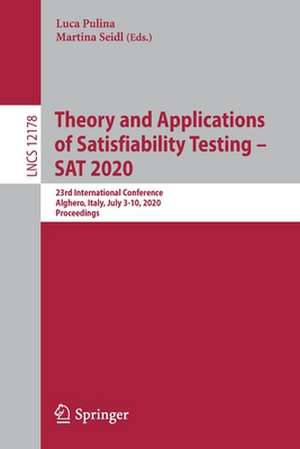Theory and Applications of Satisfiability Testing – SAT 2020: 23rd International Conference, Alghero, Italy, July 3–10, 2020, Proceedings: Lecture Notes in Computer Science, cartea 12178
Editat de Luca Pulina, Martina Seidlen Limba Engleză Paperback – iul 2020
Din seria Lecture Notes in Computer Science
- 20%
 Preț: 1061.55 lei
Preț: 1061.55 lei - 20%
 Preț: 307.71 lei
Preț: 307.71 lei - 20%
 Preț: 438.69 lei
Preț: 438.69 lei - 20%
 Preț: 579.30 lei
Preț: 579.30 lei -
 Preț: 410.88 lei
Preț: 410.88 lei - 17%
 Preț: 427.22 lei
Preț: 427.22 lei - 20%
 Preț: 596.46 lei
Preț: 596.46 lei - 15%
 Preț: 448.04 lei
Preț: 448.04 lei - 20%
 Preț: 353.50 lei
Preț: 353.50 lei -
 Preț: 389.49 lei
Preț: 389.49 lei - 20%
 Preț: 309.90 lei
Preț: 309.90 lei - 20%
 Preț: 645.28 lei
Preț: 645.28 lei - 20%
 Preț: 763.23 lei
Preț: 763.23 lei - 15%
 Preț: 580.46 lei
Preț: 580.46 lei - 20%
 Preț: 310.28 lei
Preț: 310.28 lei - 20%
 Preț: 655.02 lei
Preț: 655.02 lei - 20%
 Preț: 1183.14 lei
Preț: 1183.14 lei - 20%
 Preț: 340.32 lei
Preț: 340.32 lei -
 Preț: 449.57 lei
Preț: 449.57 lei - 20%
 Preț: 591.51 lei
Preț: 591.51 lei - 18%
 Preț: 938.83 lei
Preț: 938.83 lei - 20%
 Preț: 337.00 lei
Preț: 337.00 lei - 20%
 Preț: 649.50 lei
Preț: 649.50 lei - 20%
 Preț: 607.40 lei
Preț: 607.40 lei - 20%
 Preț: 1414.79 lei
Preț: 1414.79 lei - 20%
 Preț: 1024.44 lei
Preț: 1024.44 lei - 20%
 Preț: 583.40 lei
Preț: 583.40 lei - 20%
 Preț: 453.32 lei
Preț: 453.32 lei - 20%
 Preț: 575.49 lei
Preț: 575.49 lei - 20%
 Preț: 1075.26 lei
Preț: 1075.26 lei - 20%
 Preț: 585.88 lei
Preț: 585.88 lei - 20%
 Preț: 825.93 lei
Preț: 825.93 lei - 17%
 Preț: 360.20 lei
Preț: 360.20 lei - 20%
 Preț: 763.23 lei
Preț: 763.23 lei - 20%
 Preț: 340.32 lei
Preț: 340.32 lei - 20%
 Preț: 504.58 lei
Preț: 504.58 lei - 20%
 Preț: 369.13 lei
Preț: 369.13 lei - 20%
 Preț: 580.93 lei
Preț: 580.93 lei - 20%
 Preț: 343.62 lei
Preț: 343.62 lei - 20%
 Preț: 350.21 lei
Preț: 350.21 lei - 20%
 Preț: 583.40 lei
Preț: 583.40 lei - 20%
 Preț: 583.40 lei
Preț: 583.40 lei - 15%
 Preț: 438.59 lei
Preț: 438.59 lei - 20%
 Preț: 341.95 lei
Preț: 341.95 lei - 20%
 Preț: 238.01 lei
Preț: 238.01 lei - 20%
 Preț: 538.30 lei
Preț: 538.30 lei
Preț: 344.93 lei
Preț vechi: 431.16 lei
-20% Nou
Puncte Express: 517
Preț estimativ în valută:
66.02€ • 71.74$ • 55.50£
66.02€ • 71.74$ • 55.50£
Carte tipărită la comandă
Livrare economică 21 aprilie-05 mai
Preluare comenzi: 021 569.72.76
Specificații
ISBN-13: 9783030518240
ISBN-10: 3030518248
Pagini: 450
Ilustrații: XI, 538 p. 271 illus., 70 illus. in color.
Dimensiuni: 155 x 235 mm
Greutate: 0.76 kg
Ediția:1st ed. 2020
Editura: Springer International Publishing
Colecția Springer
Seriile Lecture Notes in Computer Science, Theoretical Computer Science and General Issues
Locul publicării:Cham, Switzerland
ISBN-10: 3030518248
Pagini: 450
Ilustrații: XI, 538 p. 271 illus., 70 illus. in color.
Dimensiuni: 155 x 235 mm
Greutate: 0.76 kg
Ediția:1st ed. 2020
Editura: Springer International Publishing
Colecția Springer
Seriile Lecture Notes in Computer Science, Theoretical Computer Science and General Issues
Locul publicării:Cham, Switzerland
Cuprins
Sorting Parity Encodings by Reusing Variables.- Community and LBD-based Clause Sharing Policy for Parallel SAT Solving.- Clause size reduction with all-UIP Learning.- Trail Saving on Backtrack.- Four Flavors of Entailment.- Designing New Phase Selection Heuristics.- On the Effect of Learned Clauses on Stochastic Local Search.- SAT Heritage: a community-driven effort for archiving, building and running more than thousand SAT solvers.- Distributed Cube and Conquer with Paracooba.- Reproducible E cient Parallel SAT Solving.- Improving Implementation of SAT Competitions 2017-2019 Winners.- On CDCL-based Proof Systems with the Ordered Decision Strategy.- Equivalence Between Systems Stronger Than Resolution.- Simplified and Improved Separations Between Regular and General Resolution by Lifting.- Mycielski graphs and PR proofs.- Towards a Better Understanding of (Partial Weighted) MaxSAT Proof Systems.- Towards a Complexity-theoretic Understanding of Restarts in SAT solvers.- On the Sparsityof XORs in Approximate Model Counting.- A Faster Algorithm for Propositional Model Counting Parameterized by Incidence Treewidth.- Abstract Cores in Implicit Hitting Set MaxSat Solving.- MaxSAT Resolution and SubCube Sums.- A Lower Bound on DNNF Encodings of Pseudo-Boolean Constraints.- On Weakening Strategies for PB Solvers.- Reasoning About Strong Inconsistency in ASP.- Taming High Treewidth with Abstraction, Nested Dynamic Programming, and Database Technology.- Reducing Bit-Vector Polynomials to SAT using Groebner Bases.- Speeding Up Quantified Bit-Vector SMT Solvers by Bit-Width Reductions and Extensions.- Strong (D)QBF Dependency Schemes via Tautology-free Resolution Paths.- Short Q-Resolution Proofs with Homomorphisms.- Multi-Linear Strategy Extraction for QBF Expansion Proofs via Local Soundness.- Positional Games and QBF: The Corrective Encoding.- Matrix Multiplication: Verifying Strong Uniquely Solvable Puzzles.- Satisfiability Solving Meets Evolutionary Optimisation in Designing Approximate Circuits.- SAT Solving with Fragmented Hamiltonian Path Constraints for Wire Arc Additive Manufacturing.- SAT-based Encodings for Optimal Decision Trees with Explicit Paths.- Incremental Encoding of Pseudo-Boolean Goal Functions based on Comparator Networks.
